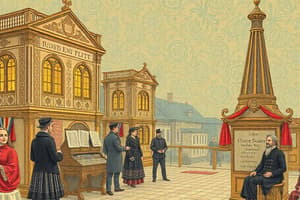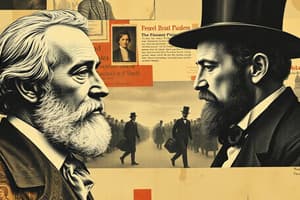Podcast
Questions and Answers
What was the primary concern of the Enlightenment thinkers?
What was the primary concern of the Enlightenment thinkers?
- Defending the rights of the clergy and nobility
- Promoting absolute monarchy as the best form of government
- Challenging traditionally accepted ideas and emphasizing reason and individualism (correct)
- Advocating for the superiority of the state of nature
Who believed that man in his natural state is good except for a few bad apples?
Who believed that man in his natural state is good except for a few bad apples?
- Thomas Hobbes
- Louis XVI
- John Locke (correct)
- Voltaire
What was the primary reason for the French people's anger and hunger before the French Revolution?
What was the primary reason for the French people's anger and hunger before the French Revolution?
- The Storming of the Bastille
- The privileged classes of the Ancien Régime
- The severe shortage of bread, leading to widespread hunger (correct)
- The absolute monarchy of Louis XVI
What was the Estates General in France?
What was the Estates General in France?
Who was executed in 1793 during the French Revolution?
Who was executed in 1793 during the French Revolution?
What is the primary difference between debt and deficit?
What is the primary difference between debt and deficit?
What was the significance of the Tennis Court Oath?
What was the significance of the Tennis Court Oath?
What was the event that marked the start of the French Revolution?
What was the event that marked the start of the French Revolution?
What was the primary reason behind the March on Versailles?
What was the primary reason behind the March on Versailles?
What was the outcome of Louis XVI's attempted escape in 1791?
What was the outcome of Louis XVI's attempted escape in 1791?
What was the primary purpose of the Continental System?
What was the primary purpose of the Continental System?
What was the outcome of Napoleon's invasion of Russia in 1812?
What was the outcome of Napoleon's invasion of Russia in 1812?
What was the title taken by Napoleon in 1802, consolidating his power?
What was the title taken by Napoleon in 1802, consolidating his power?
What was the Russian strategy employed against Napoleon's army during the invasion of Russia?
What was the Russian strategy employed against Napoleon's army during the invasion of Russia?
What was the significance of the Declaration of the Rights of Man and Citizen?
What was the significance of the Declaration of the Rights of Man and Citizen?
Where was Napoleon exiled after his final defeat at the Battle of Waterloo?
Where was Napoleon exiled after his final defeat at the Battle of Waterloo?
Flashcards are hidden until you start studying
Study Notes
Enlightenment and Pre-Revolutionary France
- The Enlightenment was an 18th-century intellectual movement emphasizing reason, individualism, and challenging traditional ideas.
- John Locke believed in natural rights (life, liberty, and property) and advocated for a constitutional monarchy.
- Thomas Hobbes believed in a strong central authority to avoid chaos and thought man in nature is evil.
- Voltaire championed freedom of speech and religion, famously stating "I may not agree with what you say, but I will defend to the death your right to say it."
- The Estates General represented the three estates of France: Clergy (First Estate), Nobility (Second Estate), and Commoners (Third Estate).
- The Ancien Régime was the pre-Revolutionary French political and social system.
French Revolution
- The Tennis Court Oath was a vow by the Third Estate not to disband until a constitution was written.
- The Storming of the Bastille marked the start of the French Revolution on July 14, 1789.
- The March on Versailles was a protest led by women against high bread prices, resulting in the royal family being brought to Paris.
- Louis XVI's Attempted Escape in 1791 led to increased public distrust.
- The Declaration of the Rights of Man and Citizen defined individual and collective rights during the Revolution.
- Robespierre was a leader associated with the Reign of Terror, a period of radical phase with mass executions.
- The Guillotine was a device used for executions during the Revolution.
French Revolution (continued)
- The Directory was a five-member committee that governed France from 1795 to 1799 after Robespierre's fall.
- Louis XVI's treason trial and execution led to the end of the monarchy.
Napoleonic Era
- The Napoleonic Code was a legal code established by Napoleon that influenced many legal systems worldwide.
- Napoleon took power through a coup d'État and became Consul for Life in 1802, consolidating his power.
- The Continental System was Napoleon's policy aimed at damaging the British economy by forbidding European trade with Britain.
- The Peninsular War (1808-1814) saw Spanish and Portuguese forces, supported by Britain, fight against French invasion.
- The Concordat of 1801 reestablished the Catholic Church in France.
- Napoleon's disastrous Invasion of Russia (1812) led to severe losses, and the Russian strategy of "Burn and Retreat" weakened Napoleon's army.
- Napoleon was exiled to Elba, then finally defeated at Waterloo and exiled again to Saint Helena.
Studying That Suits You
Use AI to generate personalized quizzes and flashcards to suit your learning preferences.




